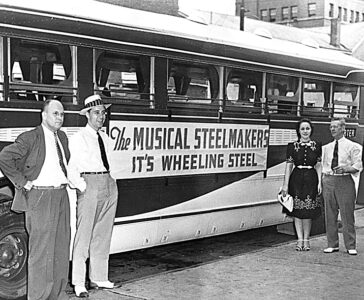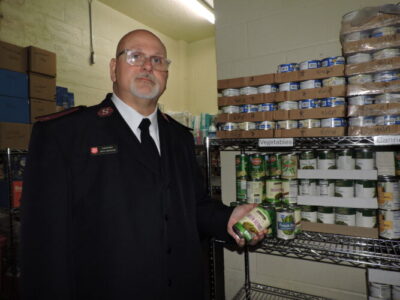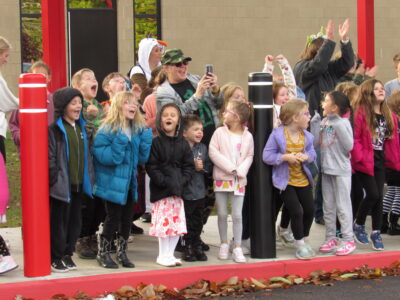This Week in West Virginia History

Radio show “It’s Wheeling Steel” debuts over WWVA in Wheeling — Nov. 8, 1936
The following events happened on these dates in West Virginia history. To read more, go to e-WV: The West Virginia Encyclopedia at www.wvencyclopedia.org.
Nov. 2, 1859: John Brown was convicted of murder, treason and insurrection in the Jefferson County Courthouse at Charles Town. Brown’s raid on Harpers Ferry galvanized the nation, further alienating North and South and drastically reducing any possible middle ground for compromise to avert the Civil War.
Nov. 2, 1944: During World War II, Robert Femoyer of Huntington was severely wounded while flying over Germany but flew his crew safely back to Great Britain. He died shortly after being removed from the plane and was posthumously awarded the Medal of Honor.
Nov. 2, 1952: Tri-State Airport in Wayne County was dedicated, with the first official landing made at 11 a.m. by Piedmont Airlines.
Nov. 2, 1996: Baseball player Toni Stone died. Born in Bluefield, she joined the Negro American League in 1953, becoming the first woman to play pro baseball in a previously all-male major league.
Nov. 3, 1947: Kanawha Airport (now Yeager International Airport) was dedicated. World War I ace Capt. Eddie Rickenbacker was among the dignitaries present.
Nov. 4-5, 1985: Heavy rains led to devastating floods in parts of West Virginia. Forty-seven people were killed, and several towns were severely damaged.
Nov. 5, 1891: Alfred Earle “Greasy” Neale was born in Parkersburg. He was one of West Virginia’s greatest all-around athletes.
Nov. 5, 1922: Cecil Underwood was born at Josephs Mills in Tyler County. Underwood, West Virginia’s 25th and 32nd governor, served as both the state’s youngest and oldest chief executive.
Nov. 5, 1927: Musician “Ellie” Mannette was born in Trinidad and helped popularize steel drum music worldwide. In 1992, he became an artist-in-residence at WVU, coordinating the school’s steel drum program. In 1999, he was named a National Endowment for the Arts National Heritage Fellow, the nation’s highest arts honor.
Nov. 6, 1863: Confederate troops led by Brig. Gen. John Echols were defeated at Droop Mountain by a larger federal force led by Brig. Gen. William W. Averell. This was one of the most important Civil War battles fought on West Virginia soil.
Nov. 6, 1923: A methane gas explosion killed 27 men inside the Glen Rogers coal mine in Wyoming County. The mine, which opened in 1921, became one of the state’s largest. A total of 160 fatalities over a 31-year period occurred at the mine before it was closed.
Nov. 7, 1775: The historic Forks-of-Cheat Baptist Church was organized about six miles north of Morgantown. It is the oldest church with continuous records west of the Alleghenies in West Virginia.
Nov. 7, 1943: During World War II, Medal of Honor recipient Herbert J. Thomas Jr. was killed in the South Pacific. Thomas, who grew up in South Charleston, died by throwing himself on a grenade, saving his fellow squad members. WVU Medicine’s Thomas J. Memorial Hospital in South Charleston is named in his honor.
Nov. 8, 1936: “It’s Wheeling Steel,” a half-hour musical variety radio program, debuted over WWVA in Wheeling. The program was an instant success with local audiences and later became a nationwide sensation.
Nov. 8, 1936: Politician Darrell McGraw was born in Wyoming County. He served on the West Virginia Supreme Court of Appeals (1977-89) and was West Virginia’s longest-serving Attorney General in history (1993-2013). He died in 2024.




